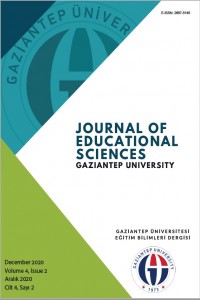Opinions of School Administrators and Teachers Regarding Digital Content and Skill-Assisted Transformation Targets in Learning Processes*
Abstract
This article was produced from a qualitative study conducted to gather the opinions of school administrators and teachers about "Digital content and skill-assisted transformation targets in learning processes", which is one of the objectives of MEB 2023 Education Vision. Seven school administrators, three assistant managers and 10 teachers were asked to answer the following questions: 1. What is the opinion of school administrators and teachers about digital content and skill-assisted transformation targets in learning processes? 2. What is the opinion of school teachers and teachers about their readiness for digital leadership? 3. What do school administrators and teachers think about the applicability of these goals in their schools? The study shows that the participants agreed that digitalization leads to easy access to information, personal development, and equal opportunities in education, and that the use of digital materials facilitates learning. However, the study also revealed a lack of technological infrastructure in existing schools, that school leaders lack technology leadership, and that time constraints and parents' indifference were seen as obstacles in reaching the targets. This study will reflect the trainings and experiences of school administrators and teachers in creating digital education and training culture, and by offering practical suggestions to all educators to support their development, it can be a source for research topics to achieve these goals.
References
- 1-Afshari, M.et al.,(2009). Technology and school leadership. Technology, Pedagogy and Education, 18(2), 235-248.
- 2-Alkan, C. (2011). Eğitim Teknolojisi. Ankara: Anı Yayıncılık.
- 3-Altun, S. A., & Ersoy, A. (2019). Nitel Veri Analizi. Ankara: Pegem.
- 4-Anderson, R. E., & Dexter, S. (2005). School technology leadership: an empirical investigation of prevalence and effect. Educational Administration Quarterly,, 49-82.
- 5-Bruce, C. (1997). The Seven Faces of Information Literacy. Adelaide: Auslib Press.
- 6-Çavaş, B. (2005). Bilgi ve ı̇letişim teknolojileri ile bütünleştirilmiş fen bilgisi öğrenme ortamı üzerine bir araştırma. Eurasian Journal of Educational Research, 21,88-102.
- 7-Hellinger, P., et al. (1998). Exploring the principal’s contribution to school effectiveness and school improvement. ResearchGate, 9 (2),157-191.
- 8-Irmak, M. (2015). Ilkokul ve ortaokul öğretmenlerı̇nı̇n, yönetı̇cı̇lerı̇nı̇n “teknoloji̇ lı̇derlı̇ğı̇” düzeylerine i̇lı̇şkı̇n algıları, http://acikerisim.pau.edu.tr/xmlui/,http://hdl.handle.net/11499/606
- 9-ISTE. (2002). NETS for administrators 2002. http://www.iste.org/Content/NavigationMenu/ NETS/ForAdministrators/2002Standards/NETS_for_Administrators_2002_Standards.htm: http://www.iste.org/Content/NavigationMenu/ NETS/ForAdministrators/2002Standards/NETS_for_Administrators_2002_Standards.htm adresinden alındı.
- 10-Maxwel, J. (1996). Qualitative Research Design:An interpretive approach. Thousand Oaks: CA: Sage.
- 11-Negroponte, N. (1995). Being digital, . New York: Alfred A. Knopf.
- 12-Polat, C. (2005). Üniversitelerde kütüphane merkezli bilgi okuryazarlığı programlarının geliştirilmesi: Hacettepe Üniversitesi Örneği.(Doktora tezi),Hacettepe Üniversitesi, Sosyal Bilimler Enstitüsü, Ankara.
- 13- Doğan,D.,Seferoğlu,S.,S. (2015). Eğitim Teknolojileri Okumaları. Mobil cihazlar ve eğitimde dijital dönüşüm. içinde Ankara: TOJET.
- 14-Sincar, M., & Aslan, B. (2011). İlköğretim öğretmenlerinin okul yöneticilerinin teknoloji liderliği rollerine ilişkin görüşleri. Gaziantep Üniversitesi Sosyal Bilimler Dergisi, 10 (1), 571-595.
- 15-Snavely, L., & Cooper , N. (1997). The Information Literacy Debate. The Journal of Academic Librarianship,23 (1), 9-14.
- 16-Weber, M. (2006). A study of computer technology use and technology leadership of texas elementary public-school principals. . Dissertation prepared for the Degree of Doctor of Education.
- 17-Yıldırım, A., & Şimşek, H. (2018). Sosyal bilimlerde nitel araştırma yöntemleri. Ankara: Sözkesen matbaacılık.
- 18-Yu, C., & Durrington, V. (2006). Technology Standards for School Administrators: An Analysis of Practicing and Aspiring Administrators' Perceived Ability to Perform the Standards . NASSP Bulletin,90,(4), 301-317.doi: 10.1177/0192636506295392
Details
| Primary Language | English |
|---|---|
| Subjects | Other Fields of Education |
| Journal Section | Eğitim Bilimleri |
| Authors | |
| Publication Date | December 31, 2020 |
| Published in Issue | Year 2020 Volume: 4 Issue: 2 |

